管理学原理英文版课件Chapter 2The Management Environment
合集下载
管理学英语ppt课件ppt课件
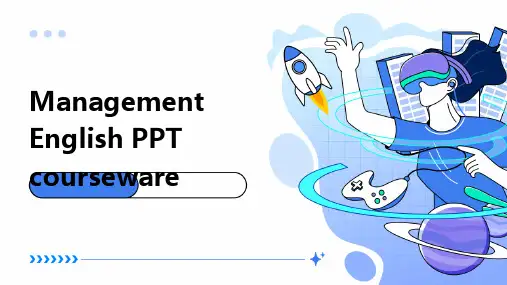
Risk control
Analyze potential risks, develop response measures, and ensure organizational safety.
Feedback and improvement
Collect feedback information, continuously improve management methods and processes.
Managerial Skills
Strategic vision
With a broad vision and the ability to plan for the long term.
Decision making ability
Scientifically analyze problems and make decisive decisions.
Communication and coordination skills
Good at communication and able to coordinate the interests of all parties.
Leadership
Unleash team potential and lead the team to grow together.
Establish an effective information communication mechanism to ensure the accuracy and timeliness of information transmission.
Leading
Motivation and Communication
管理学(英文版全套课件)
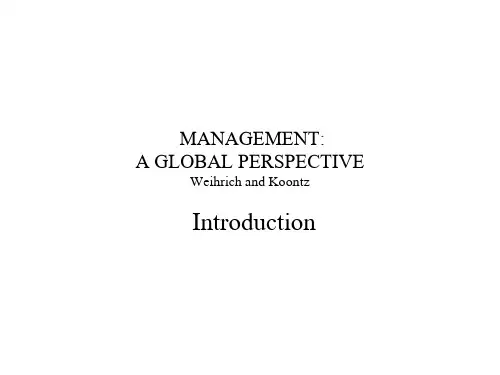
• Malcolm Baldrige National Quality Award established by the U.S. Congress in 1987 • ISO 9000, pioneered by the Europeans • European Quality Award given by the European Foundation
Arguments Against Social Involvement
• • • • • • • Violation of profit maximization Dilution of purpose Costs Too much power Lack of skills Lack of accountability Lack of universal support
• France
– Le Plan and the Cadre
• Germany
– Authority and Codetermination
• Korea
– Chaebol and Inhwa
Japanese Management
• Lifetime Employment • Seniority System • Decision Making in Japan
Chapter 2. Management and Society: The External Environment, Social Responsibility, and Ethics
The Organization and Its External Environment
Arguments for Social Involvement
Definition of Whistle-Blowing
Arguments Against Social Involvement
• • • • • • • Violation of profit maximization Dilution of purpose Costs Too much power Lack of skills Lack of accountability Lack of universal support
• France
– Le Plan and the Cadre
• Germany
– Authority and Codetermination
• Korea
– Chaebol and Inhwa
Japanese Management
• Lifetime Employment • Seniority System • Decision Making in Japan
Chapter 2. Management and Society: The External Environment, Social Responsibility, and Ethics
The Organization and Its External Environment
Arguments for Social Involvement
Definition of Whistle-Blowing
管理学原理英文版——计划planning

Guide daily activities
Of production and service
5 STEPS TO RATIONAL DECISION-MAKING
• 1. Defining the problem • 2. Establish and weight criteria • 3. Generate alternatives • 4. Evaluate alternatives • 5. Determine the best solution
TOP TO BOTTOM PLANNING
• 1. Top management develops strategic plans
Starts with firm’s
• Vision • Mission
TOP TO BOTTOM PLANNING, cont’d
• 2. Middle management
LIMITATIONS OF RATIONAL DECISION-MAKING
• 1. Bounded rationality • 2. Maximizing vs Satisficing
TECHNIQUES OF GROUP DECISION-MAKING
• 1. Nominal
• 2. Delphi
SOME DISADVANTAGES
• Some possible negatives of planning are
1. May produce a false sense of certainty 2. May inhibit change & adaptiveness 3. May be too abstract and detached from daily activity
Of production and service
5 STEPS TO RATIONAL DECISION-MAKING
• 1. Defining the problem • 2. Establish and weight criteria • 3. Generate alternatives • 4. Evaluate alternatives • 5. Determine the best solution
TOP TO BOTTOM PLANNING
• 1. Top management develops strategic plans
Starts with firm’s
• Vision • Mission
TOP TO BOTTOM PLANNING, cont’d
• 2. Middle management
LIMITATIONS OF RATIONAL DECISION-MAKING
• 1. Bounded rationality • 2. Maximizing vs Satisficing
TECHNIQUES OF GROUP DECISION-MAKING
• 1. Nominal
• 2. Delphi
SOME DISADVANTAGES
• Some possible negatives of planning are
1. May produce a false sense of certainty 2. May inhibit change & adaptiveness 3. May be too abstract and detached from daily activity
管理学原理讲义汇总
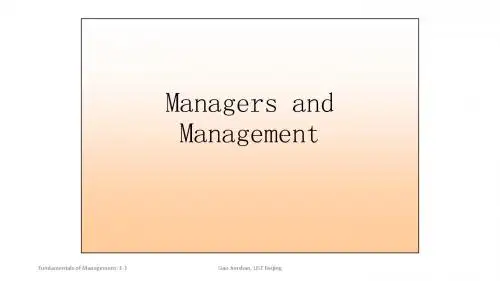
Liaison
Fundamentals of Management: 1-17
Gao Junshan, UST Beijing
Nature of management: Role model
Informational Roles
Monitor
Disseminator
Interpersonal Roles
Determining Where decisions are to be made
Fundamentals of Management: 1-13 Gao Junshan, UST Beijing
Nature of management: Functional view
Leading
Motivating employees
Entrepreneur
Nature of management: Universality
Contemporary Management Issues
Decision Making National Borders Handling Change
Fundamentals of Management: 1-23
• Relevant disciplines to management • Evolution of modern management practices • Contemporary approaches on Management
Fundamentals of Management: 1-3 Gao Junshan, UST Beijing
First-Level Managers Middle Managers Top Managers
24%
管理学原理英文版课件Chapter 2 The Management Environment
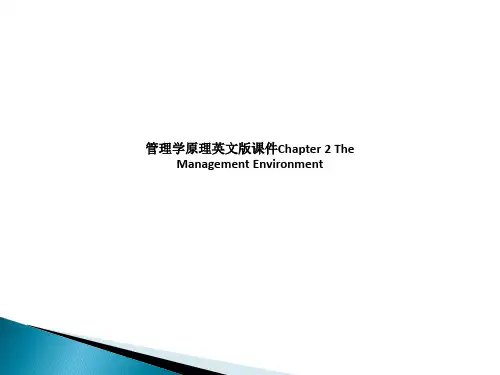
◦ Serve customers better, enhance production, provide better information, etc.
E-Organizations
• E-commerce (sales side of electronic business): any computer transaction that occurs when data are processed and transmitted over the internet
Entrepreneurship – the process of starting a business venture, organizing the necessary resources, and assuming the risks and rewards
Important Themes:
Public Expectations
Arguments for and against social responsibility by businesses must be
considered by manaibility = a firm’s obligation, beyond what is required by the law and economics, to pursue long-term goals that benefit society
advantages ◦ Starting the venture ◦ Managing the venture
Managing the Workforce
Downsizing – create more efficient operations through extensive layoffs
E-Organizations
• E-commerce (sales side of electronic business): any computer transaction that occurs when data are processed and transmitted over the internet
Entrepreneurship – the process of starting a business venture, organizing the necessary resources, and assuming the risks and rewards
Important Themes:
Public Expectations
Arguments for and against social responsibility by businesses must be
considered by manaibility = a firm’s obligation, beyond what is required by the law and economics, to pursue long-term goals that benefit society
advantages ◦ Starting the venture ◦ Managing the venture
Managing the Workforce
Downsizing – create more efficient operations through extensive layoffs
2管理学(双语)课件
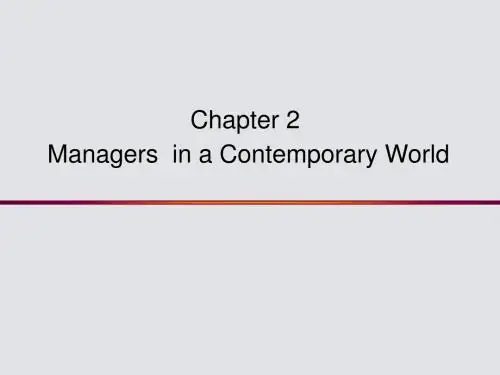
2
Learning Outcomes (cont’d) ’
6. Summarize the essential roles performed by managers. 7. Discuss whether the manager’s job is generic. 8. Describe the four general skills necessary for becoming a successful manager. 9. Describe the value of studying management. 10. Identify the relevance of popular humanities and social science courses to management practices.
– A management structure in which internal arrangements that impose artificial geographic barriers are broken down
Global Competition
• Multinational corporations (MNCs)
A Global Marketplace
• Global village
– The concept of a boundaryless world; the production and marketing of goods and services worldwide.
• Borderless organization
• Strategic alliances
– A domestic firm and a foreign firm share the cost of developing products or building production facilities in a foreign country.
Learning Outcomes (cont’d) ’
6. Summarize the essential roles performed by managers. 7. Discuss whether the manager’s job is generic. 8. Describe the four general skills necessary for becoming a successful manager. 9. Describe the value of studying management. 10. Identify the relevance of popular humanities and social science courses to management practices.
– A management structure in which internal arrangements that impose artificial geographic barriers are broken down
Global Competition
• Multinational corporations (MNCs)
A Global Marketplace
• Global village
– The concept of a boundaryless world; the production and marketing of goods and services worldwide.
• Borderless organization
• Strategic alliances
– A domestic firm and a foreign firm share the cost of developing products or building production facilities in a foreign country.
管理学(斯蒂芬 罗宾斯 第九版)英文课件(第二章)
– Wealth of Nations - Adam Smith • division of labor - breakdown of jobs into narrow and repetitive tasks increased productivity
– Industrial Revolution • substitution of machine power for human power • large organizations required formal management
– Describe the contributions of the general administrative theorists一般行政管理
– Summarize the quantitative approach定量方法 to management
– Describe the contributions of the early organizational behavior组织行为 advocates
© Prentice Hall, 2002
2-13
EARLY ADVOCATES OF OB
© Prentice Hall, 2002ehavior (cont.)
Hawthorne Studies
– started in 1924 at Western Electric Company
– use of scientific methods to define the “one best way” for a job to be done
– perspective of improving the productivity and efficiency of manual workers
– Industrial Revolution • substitution of machine power for human power • large organizations required formal management
– Describe the contributions of the general administrative theorists一般行政管理
– Summarize the quantitative approach定量方法 to management
– Describe the contributions of the early organizational behavior组织行为 advocates
© Prentice Hall, 2002
2-13
EARLY ADVOCATES OF OB
© Prentice Hall, 2002ehavior (cont.)
Hawthorne Studies
– started in 1924 at Western Electric Company
– use of scientific methods to define the “one best way” for a job to be done
– perspective of improving the productivity and efficiency of manual workers
chapter 01 Managers and Managing 《管理学》(双语)课程课件
– Taking action to increase performance as required. – The outcome of control is the ability to measure
performance accurately and regulate efficiency and effectiveness.
anizing
Structuring working relationships in a way that allows organizational members to work together to achieve organizational goals.
Organizational Structure
Three steps in the planning process – Deciding which goals to pursue – Deciding what courses of action to adopt – Deciding how to allocate resources
14
16
4. Controlling
Evaluating how well an organization is achieving its goals and taking action to maintain or improve performance.
– Monitoring individuals, departments, and the organization to determine if desired performance standards have been reached.
Challenges for Management in a Global Environment
performance accurately and regulate efficiency and effectiveness.
anizing
Structuring working relationships in a way that allows organizational members to work together to achieve organizational goals.
Organizational Structure
Three steps in the planning process – Deciding which goals to pursue – Deciding what courses of action to adopt – Deciding how to allocate resources
14
16
4. Controlling
Evaluating how well an organization is achieving its goals and taking action to maintain or improve performance.
– Monitoring individuals, departments, and the organization to determine if desired performance standards have been reached.
Challenges for Management in a Global Environment
管理学原理第二章
•
Current
•
Issues and Trends
Explain why we need to look at the current trends and issues facing managers. Describe the current trends and issues facing managers.
Advocated the division of labor (job specialization) to increase the productivity of workers a hospital surgery team; restaurant kitchens
Industrial Revolution Substituted machine power for human labor Created large organizations in need of management
Scientific Management
Fredrick Winslow Taylor Putting the right person on the job with the correct tools and equipment. Having a standardized method of doing the job. Providing an economic incentive to the worker. Frank and Lillian Gilbreth Focused on increasing worker productivity through the reduction of wasted motion Developed the micro chronometer to time worker motions and optimize work performance The meaning of Science management Production is highly labor-intensive, builders ‗ major cost are brick and worker
管理学原理英文版最新版教学课件第2章
How Do Employees Learn the Culture?
Organizational stories: narrative tales of significant events or people.
Corporate rituals: repetitive sequences of activities that express and reinforce important organizational values and goals.
Culture Is:
• Perceived • Descriptive • Shared
Exhibit 2-4 Dimensions of Culture
Learning Organizational Culture
Where Does Culture Come From? Usually reflects the vision or mission of founders. Founders project an image of what the organization should be and what its values are.
Source: Robbins, Stephen P., Coulter, Mary, Management, 13th Ed., © 2016, p. 86. Reprinted and electronically reproduced by permission of Pearson Education, Inc., New York, NY.
Exhibit 2-2 Environmental Uncertainty Matrix
Managing Stakeholder Relationships
- 1、下载文档前请自行甄别文档内容的完整性,平台不提供额外的编辑、内容补充、找答案等附加服务。
- 2、"仅部分预览"的文档,不可在线预览部分如存在完整性等问题,可反馈申请退款(可完整预览的文档不适用该条件!)。
- 3、如文档侵犯您的权益,请联系客服反馈,我们会尽快为您处理(人工客服工作时间:9:00-18:30)。
International Business
Multinational corporations Transnational corporations Borderless organizations
Challenges for Managers: Culture and Environment
5 Dimensions of National Culture:
– Power distance – Individual versus collective – Quantity versus quality of life – Uncertainty avoidance – Long versus short-term orientation
Core employees
Customers
Pleasing customers
– This has gotten more and more difficult because consumers now have more and more choices
Attitude and Profit
GLOBE Dimensions
Using Technology
Equipment/methods designed to make work more efficient
Serve customers, enhance production, provide better information to decision makers
Manager’s role
Managers can affect customer satisfaction through labor by:
– Selection – Training – Organizing – Empowerment – Leadership – Evaluation – Rewards
– They must trust their employees
Organization’s Revenue/Profit
Customer Attitude
Employee Attitude
Responsiveness Culture
Key Variables
Employees – outgoing/friendly Freedom to meet customers’ requirements Empowering employees Listening skills
E-Organizations
E-commerce E-business
Expectations
Social responsibility
– Social obligation – Social responsiveness – Ethics
Morality Values Personality Experiences
Entrepreneurship
Entrepreneurship:
– Pursuit of opportunities – Innovation – Growth
ห้องสมุดไป่ตู้
Entrepreneurship
Steps:
– Exploring the entrepreneurial context – Identifying opportunities and possible competitive
Quality and Improvement
Quality management Continuous improvement Work process engineering
Letting-Go/Coaching
Managers cant’ know every job, every system, or every policy
管理学原理英文版课件Chapter 2The Management Environment
Evolution of Modern Civilization
Agriculture : 1890s Industrialization : 1890s – 1960s Information Wave : 1970s - present
advantages – Starting the venture – Managing the venture
Managing Labor
Downsizing Rightsizing Outsourcing
Types of Workers
Contigent workers
– Part time employees – Temporary employees – Contract workers
